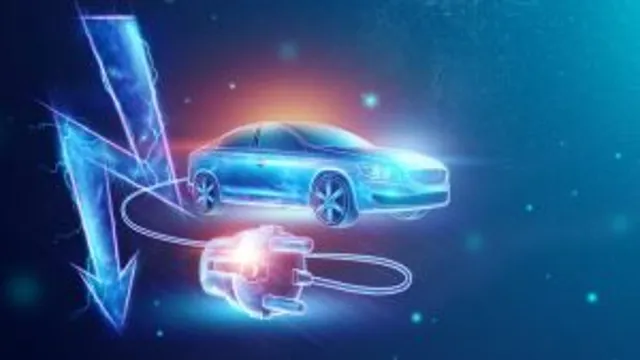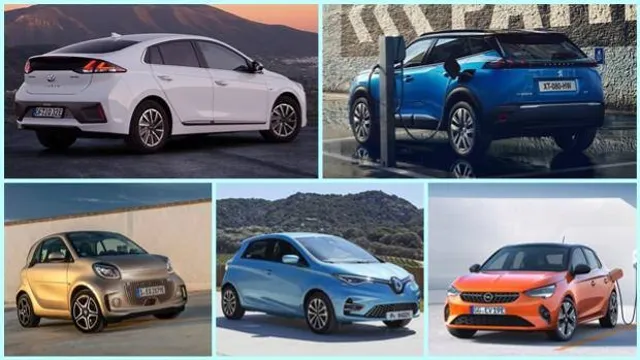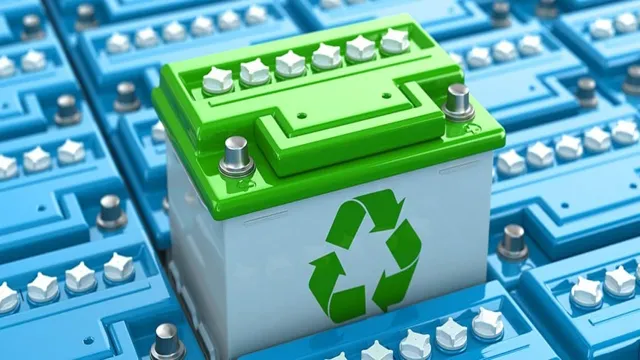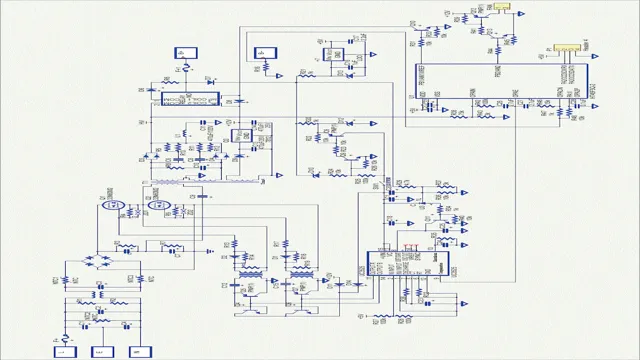Shocking Predictions for Electric Car Batteries: A Glimpse into the Future
As we move towards an increasingly sustainable world, electric cars have become increasingly popular. However, one of the biggest concerns with these vehicles is their battery life and how long they last. But with recent advancements in technology, experts are predicting some exciting developments in the world of electric car batteries.
According to some of the latest predictions, we could be seeing batteries that last for up to 1,000 miles on a single charge within the next ten years. This would be a game-changer for the electric car industry, making long-distance travel more convenient and reliable for drivers. But what exactly is driving this progress? Scientists and engineers are experimenting with new materials and designs that could boost battery energy density, allowing for more energy to be stored in a smaller space.
This could mean lighter batteries that take up less room, making electric cars more practical and affordable. With these developments, the future of electric cars is looking brighter than ever. As we continue to strive towards a greener future, we can expect to see more exciting advancements in battery technology that could change the way we think about transportation.
Current State of Electric Car Batteries
Electric car battery predictions have been the topic of much speculation in recent years. While it is clear that electric vehicles are becoming increasingly popular, there is still much debate about the optimal battery design to make these vehicles practical for everyday use. Many experts are predicting that lithium-ion batteries will continue to dominate the electric car market in the near future, but there is also a growing interest in alternative technologies such as solid-state batteries.
These batteries are widely viewed as being more environmentally friendly than their liquid counterparts, and they also offer the potential for faster charging times and longer ranges. Despite these promising developments, it is clear that there is still much work to be done before electric cars become truly mainstream. However, with advances in technology and growing public awareness of the need for eco-friendly vehicles, it seems likely that these predictions will soon become a reality.
Cost Per kWh
Electric car batteries have come a long way over the years, and one of the most important factors that determine their performance is their cost per kWh. This is the cost of producing one unit of energy that the battery can store, and it’s a crucial metric for determining the affordability and efficiency of electric vehicles. In recent years, the cost per kWh of electric car batteries has been declining steadily, making them more accessible and affordable for the average consumer.
This is largely due to advancements in battery technology, which have made it possible to produce batteries that are lighter, more compact, and more powerful than ever before. As a result, electric cars are becoming increasingly competitive with traditional gasoline vehicles in terms of cost and performance, and this trend is poised to continue as battery technology continues to improve in the coming years.
Driving Range
Electric Car Batteries The current state of electric car batteries is impressive, with constantly improving technology leading to greater driving ranges and faster charging times. While early electric cars could only cover short distances, modern vehicles have the potential to travel hundreds of miles on a single charge. This is largely due to the evolution of lithium-ion battery cells, which are lighter and more energy dense than previous battery technologies.
In addition, advances in battery management and cooling systems have made it possible to extend the lifespan of these cells, which can now last for well over a decade. But challenges still remain, particularly in terms of the cost of these systems and the limitations of charging infrastructure. Nonetheless, the promise of a cleaner, more sustainable mode of transportation has driven interest in electric cars and the development of more effective battery technologies.
Battery Innovations on the Horizon
Electric cars are becoming more popular as the world moves towards a more sustainable future. One of the main concerns with electric vehicles is their battery life and charge time. However, there are several battery innovations on the horizon that could alleviate these concerns.
Predictions show that solid-state batteries, which use a solid electrolyte instead of a liquid one, could increase the energy density of batteries by 50%. This would lead to longer driving ranges and shorter charge times. Additionally, researchers are exploring the use of different materials such as silicon and lithium-sulfur, which could also improve battery performance.
With these advancements, the future of electric cars looks bright, and we can expect even more exciting developments in the coming years.
Solid State Batteries
Solid state batteries are a promising new innovation on the horizon for the battery industry. These batteries differ from traditional lithium-ion batteries in that they use a solid electrolyte instead of a liquid one. This makes them safer, more energy-dense, and longer-lasting than their liquid counterparts.
Not only that, but solid-state batteries are also smaller and easier to work with, making them ideal for use in portable devices. There is still work to be done before we can see these batteries in widespread use, but the future is looking bright for this new technology. With solid-state batteries, we could see major advancements in electric vehicles, wearable technology, and other areas that rely on efficient, long-lasting power.
As research and development continues, the potential for new and exciting battery-powered innovations is endless.
Lithium-Sulfur Batteries
Lithium-sulfur batteries are an upcoming technology in the field of energy storage. These batteries offer a range of benefits, such as high energy density, low cost, and a reduced environmental impact. One of the most exciting features of lithium-sulfur batteries is their potential to store more energy than current lithium-ion batteries.
This increased energy storage capacity could have far-reaching implications, from powering electric cars to enabling long-term storage of renewable energy. Another advantage is their reduced weight, making them ideal for applications where weight is a crucial factor. However, lithium-sulfur batteries are still in the early stages of development, and there are several challenges that need to be addressed before they become commercially viable.
These include issues related to the stability and lifespan of the batteries, as well as safety concerns. Despite these challenges, the potential benefits of lithium-sulfur batteries make them an exciting area of research, and many experts believe they have the potential to transform the energy storage landscape in the future.
Graphene Batteries
In recent years, the world has been in dire need of more sustainable and efficient battery technology. That’s where graphene batteries come in. These new batteries, made with graphene-based materials, promise to revolutionize the industry with their increased energy density, longer lifespan, and faster charging times.
Graphene is an ultra-thin, highly conductive material that can provide a large surface area for electrochemical reactions. And the best part? Graphene is abundant and cheap, making it a promising candidate for mass production. With graphene batteries, we can expect longer-lasting and more powerful electric cars, smartphones, and other electronic devices.
As we move towards a more sustainable future, graphene batteries could play a significant role in reducing our reliance on fossil fuels and reducing our carbon footprint. The potential of graphene batteries is enormous, and the future looks bright for this innovative technology.
Predictions for the Future of Electric Car Batteries
It’s an exciting time for electric cars, and the future is looking brighter than ever. Many experts predict significant advancements in the field of electric car batteries over the coming years. Firstly, we can expect improvements to the battery’s capacity, with ranges expected to increase by up to 50%.
Secondly, advancements in battery technology will lead to faster charging times. Lithium-ion batteries are currently the most common type of battery used in electric vehicles, but new technologies like solid-state batteries could revolutionize the industry, providing even higher energy density and faster charging times. Additionally, we can expect more affordable batteries to become available, which will make electric vehicles more accessible to the masses.
As technology continues to advance, electric cars are becoming increasingly practical, economical, and environmentally friendly, and we look forward to seeing the continued progress in the coming years.
Lower Cost and Higher Efficiency
As we move towards a greener and more sustainable future, electric cars are becoming increasingly popular. One of the main concerns with electric cars has always been the cost and efficiency of the batteries that power them. However, recent advances in technology have made it possible to lower the cost and improve the efficiency of electric car batteries.
Predictions for the future of electric car batteries are exciting, with experts suggesting that we will see more affordable batteries with longer ranges in the near future. This is great news for consumers who want to switch to electric cars but have been hesitant due to the upfront cost. Additionally, with higher efficiency, electric vehicles will become even more practical, allowing for longer drives and fewer charging stops.
The future of electric car batteries is looking brighter than ever, and we can expect to see even more exciting developments in the years to come.
Extended Driving Ranges
Electric car batteries have come a long way in the past decade, but the future holds even more exciting advancements. Extended driving ranges are predicted to become the norm for electric vehicles, with some estimates suggesting ranges of up to 1,000 miles per charge. This is due to the development of new battery materials and designs that offer higher energy densities and faster charging times.
For example, solid-state batteries have the potential to double the energy density of current lithium-ion batteries while also being safer and more stable. In addition, research is underway into using metal-air batteries that could last up to five times longer than current lithium-ion batteries. With these advancements, electric cars are set to become a more practical option for longer journeys and could even rival the range of traditional fossil-fuel-powered cars.
Imagine taking a road trip without ever having to stop for gas – it may soon be possible with the latest in electric car battery technology.
Implications for the Future of Transportation
Electric car battery technology has rapidly advanced in recent years, with predictions suggesting even further developments in the future. Analysts point to the growing demand for electric vehicles and the need to decrease carbon emissions as driving forces behind battery innovation. In the coming years, electric vehicle batteries are predicted to have longer ranges, faster charging times, and more affordability.
The use of solid-state batteries is also anticipated to become more prevalent, as they promise more energy density, faster charging, longer lifetimes, and improved safety features. This shift towards alternative energy sources and emission reductions has immense implications for the future of transportation. As battery technology becomes more affordable and accessible, the reliance on fossil fuels may decrease, reducing the transportation sector’s environmental impact.
The shift towards electric cars also has the potential to revolutionize the automotive industry, creating new job opportunities and transforming traditional supply chains. In summary, electric car battery technology developments will continue to shape the future of transportation, providing long-term sustainability solutions and technological advancements.
Conclusion
In conclusion, the future of electric car batteries is charged with potential. With advancements in technology and a growing demand for sustainable transportation, the possibilities for longer range, faster charging, and more efficient batteries are electrifying. Who knows, perhaps one day we’ll be able to power not only our cars, but entire cities with these incredible power sources.
The future is bright, the future is green, and the future is electric cars!”
FAQs
What is the expected lifespan of an electric car battery?
The average lifespan of an electric car battery is approximately 8-10 years.
Can an electric car battery be recharged using a regular power outlet at home?
Yes, most electric car batteries can be charged using a standard 120-volt power outlet.
How much does it cost to replace an electric car battery?
The cost of replacing an electric car battery can vary depending on the make and model of the vehicle, but can range anywhere from $3,000 to $10,000.
What advancements are being made in electric car battery technology?
Advancements in electric car battery technology include increased range, faster charging times, and longer lifespan through the use of new materials and designs. There is also ongoing research in developing solid-state batteries that could potentially provide even greater energy density and safety.





